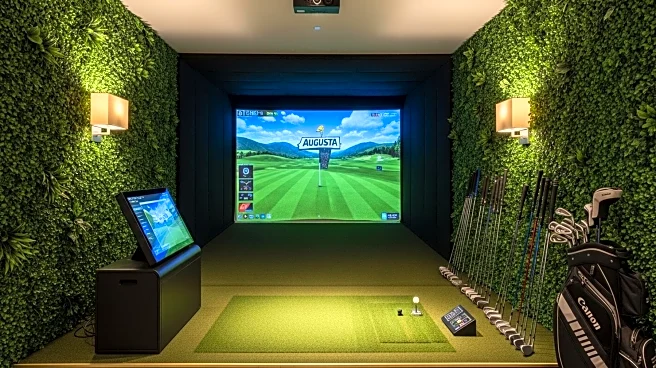What's Happening?
Back Nine Golf has launched a new golf simulator facility in Augusta, Georgia, offering an innovative way for golf enthusiasts to practice their game. The facility, located on Davis Road, is managed by Tristan Sprankle, who demonstrated the use of the advanced golf simulator. The simulator records data on each swing, providing golfers with detailed feedback to improve their skills. The facility also includes multiple golf stations and a putting green, designed to cater to both amateur and professional golfers looking to refine their techniques. This development marks a significant addition to Augusta's sports offerings, providing a modern and accessible venue for golf practice.
Why It's Important?
The opening of Back Nine Golf's simulator facility is a notable development for the local sports community in Augusta, a city renowned for its association with golf, particularly the Masters Tournament. This facility offers a year-round option for golfers to practice, regardless of weather conditions, which can be a limiting factor for outdoor sports. By providing detailed swing analysis and feedback, the simulator can help golfers of all levels improve their game, potentially increasing participation in the sport. Additionally, the facility may attract visitors to Augusta, contributing to the local economy and reinforcing the city's reputation as a golf hub.
What's Next?
As Back Nine Golf establishes itself in Augusta, it is likely to see increased patronage from local golfers and visitors. The facility may consider expanding its offerings, such as hosting golf clinics or tournaments, to further engage the community. Additionally, partnerships with local golf clubs or schools could be explored to integrate the simulator technology into training programs. The success of this facility could inspire similar developments in other regions, promoting the use of technology in sports training.
Beyond the Headlines
The introduction of advanced simulator technology in golf training highlights the growing trend of integrating technology into sports. This shift not only enhances training methods but also makes sports more accessible to a wider audience. The facility's ability to provide detailed feedback on performance can lead to more personalized training, potentially improving overall athletic performance. Furthermore, the use of simulators can reduce the environmental impact associated with maintaining traditional golf courses, aligning with broader sustainability goals.









